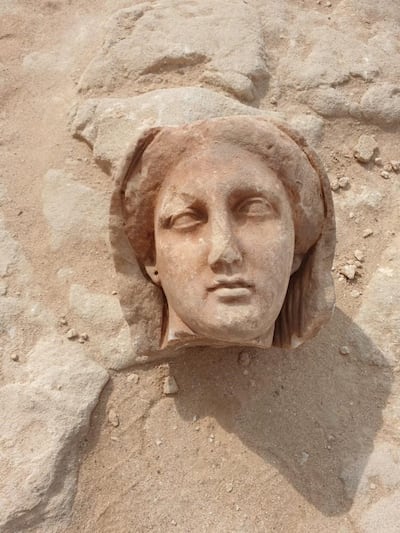A lawyer in Egypt has filed a lawsuit against Netflix, accusing the video streaming platform of trying to "erase the Egyptian identity", after the casting of a biracial actor in an upcoming docudrama about the life of Queen Cleopatra VII.
It is the latest development amid fallout in Egypt over the casting of biracial British actor and screenwriter Adele James in African Queens: Queen Cleopatra.
The work produced by Jada Pinkett Smith has sparked debate online and across the country about representation in film.
Lawyer Mahmoud Al Semary filed the case with the public prosecutor earlier this week, demanding that the state block access to Netflix, the BBC reported.

He claimed that the series includes content that breaches Egypt's media laws and was attempting to promote thinking, "which includes slogans and writings aimed at distorting and erasing the Egyptian identity.”
Separately, leading Egyptologist and former minister of state for antiquities Zahi Hawass told Egypt's Al Masry Al Youm newspaper that James's depiction was "completely fake"
"Cleopatra was Greek, meaning that she was light-skinned, not black."
The reaction in Egypt is only a small part of a wider discussion regarding James's casting as one of Egypt's most famous rulers.
While Cleopatra was from a Greek-speaking dynasty linked to Alexander the Great's Macedonian general Ptolemy, and ruled between 51 and 30 BC, there is debate about her heritage as her mother is not known.
Netflix's companion site Tudum wrote that the show aims to help audiences "learn about the fearless, captivating lives of queens who were likely not part of their western academic curriculum."
It says the decision to cast a biracial actor in the leading role was "a nod to the centuries-long conversation about the ruler’s race."
"During the time of her reign, Egypt’s population was multicultural and multiracial. Cleopatra’s race was unlikely to be documented, and the identities of her mother and paternal grandparents weren’t known. Some speculate she was a native Egyptian woman while others say she was Greek," Tudum wrote.

The backlash, however, has extended far outside Egypt with many online calling it ahistorical.
However, James hit back at those criticising the move, saying they didn't need to watch it.
"If you don’t like the casting don’t watch the show. Or do and engage in (expert) opinion that is different to yours. Either way, I’M GASSED and will continue to be," she tweeted, adding that as well as hate she's had an overwhelming outpouring of support.
Pinkett-Smith also discussed the decision in an interview with Tudum to promote the show, saying it had been important for her to cast a woman of colour as Cleopatra.
"I really wanted to represent black women,” she said. “We don’t often get to see or hear stories about black queens, and that was really important for me."
It is far from the first time that the casting of an actor playing Cleopatra has caused controversy.
In 2020, many Egyptians expressed anger at the news that actor Gal Gadot had been cast in a Hollywood adaptation of the life of the queen, saying it was an act of cultural piracy for an Israeli to play the Egyptian role.

